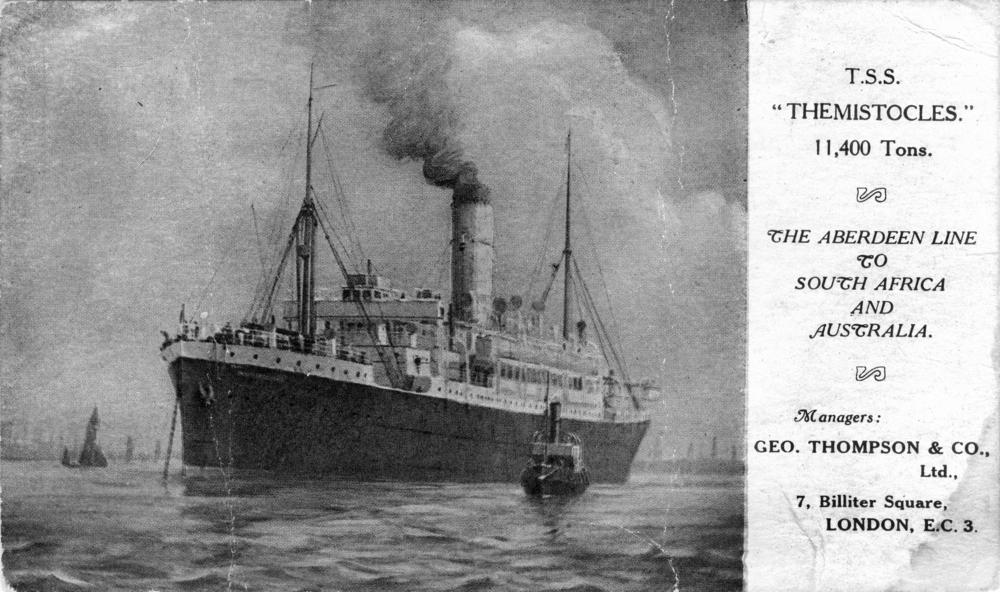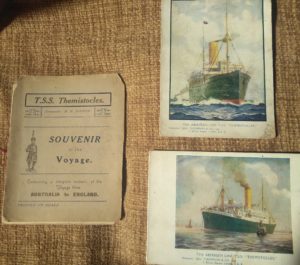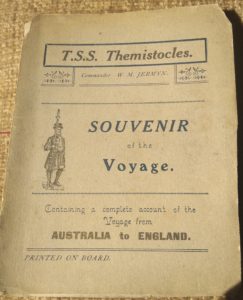I have long thought that most of the romance has gone out of travelling by ship. These days when cruises are advertised they are slick with a television star clowning around on a fictional cruise somewhere in the world. Obviously, these ads work as there is a healthy industry in these leisure activities but it was not always like this. Before the advent of commercial air travel, if you wanted to visit Australia or South Africa or even India to name but three, then you would have had to travel by ship. If you want to travel to any of these countries today, then you just jump on a long haul flight and you are there in a matter of hours. The world is a smaller place and travel has changed beyond recognition. But it was not always like that and this was confirmed by a small find of mine at an antiques fair recently.
I had not gone to the Corn Exchange with the intention of buying anything, but just to look around and get back into the swing of Hungerford time having been away for a couple of weeks. In truth, Caron and I were rather travelled out and just wanted a little bit of us time after bombing around in both England and France. Rather like the Arcade you are never quite sure what you are going to find at the Hungerford Antiques Fair.
By the time we arrived the fair was beginning to wrap up, but I noticed a table of ephemera almost as soon as I entered the hall. There were a number of interesting items for sale but it was a collection of items from a long forgotten ship (she was scrapped in Scotland in 1947) that took my fancy. In essence my find consisted of two menus and a souvenir of a voyage of the TSS Themistocles dating from the early 1920s.
The menus (which both have a illustration of the handsome ship on their covers) are both dated and are treasures of social history on their own. The older one dates from 20th of March 1922, which happened to be a Sunday. It is a dinner menu offering such delights as Veal Cutlets and Bacon, Cod Roe on Toast (there was much more on offer and I have resisted mentioning the Haricot Beans a la Bretonne or the Macedoine of Fruit in an effort not to highlight my lack of knowledge on what these dishes actually are). This dinner was also accompanied by a programme of music which ranged from a selection of Sullivan to The Quaker Girl.
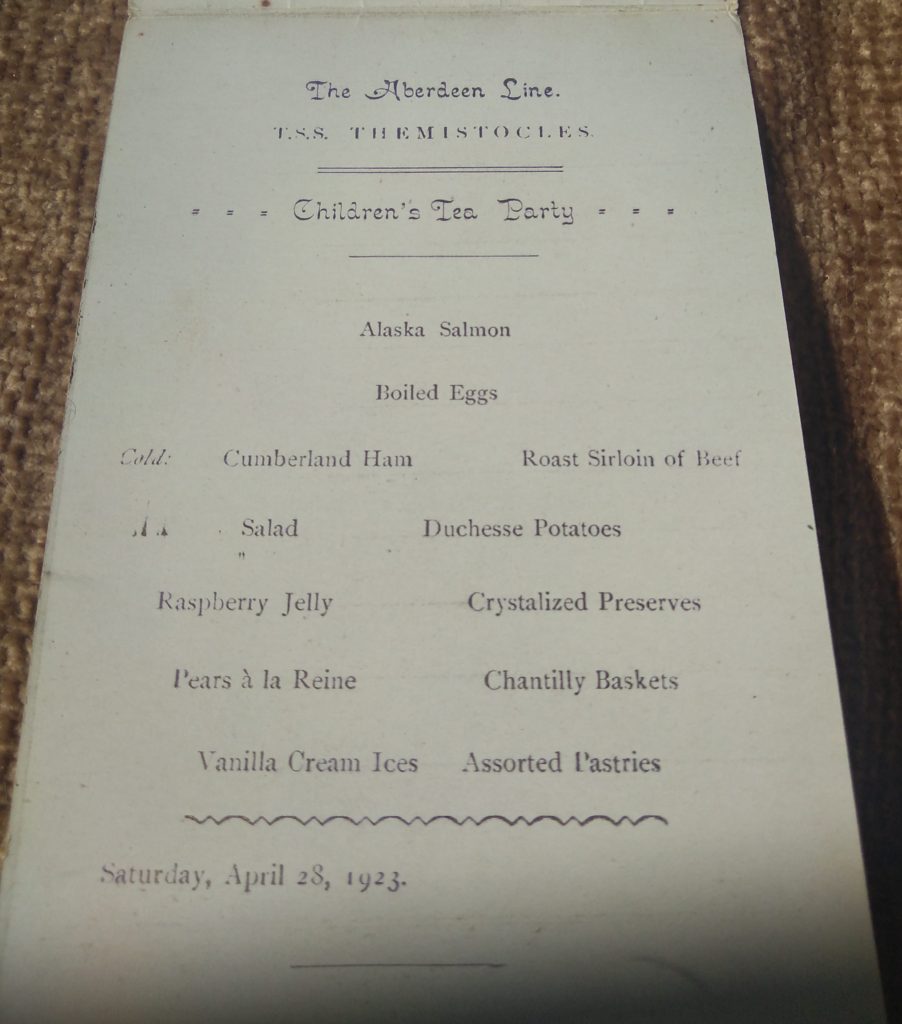 The second menu is dated from the 28th of April 1923 and is a kids menu. (It proves to me, that in those days, parents actually took their little darlings on voyages with them instead of putting as many miles as possible between them and their children, which is normally the case these days). The menu was rather grandly titled “The Children’s Tea Party”, but there was not a super hero burger or a Disney ice cream to be found anywhere on it. Instead, the next generation were treated to Alaska Salmon followed by Roast Sirloin of Beef with Duchesse Potatoes and finished off with Pears a la Reine and Chantilly Baskets to name but two of the selections.
The second menu is dated from the 28th of April 1923 and is a kids menu. (It proves to me, that in those days, parents actually took their little darlings on voyages with them instead of putting as many miles as possible between them and their children, which is normally the case these days). The menu was rather grandly titled “The Children’s Tea Party”, but there was not a super hero burger or a Disney ice cream to be found anywhere on it. Instead, the next generation were treated to Alaska Salmon followed by Roast Sirloin of Beef with Duchesse Potatoes and finished off with Pears a la Reine and Chantilly Baskets to name but two of the selections.
As I wrote this, the thought came to me that a number of these children would have been in adulthood when the Second World War started in 1939. I wonder if any of them during those wretched years looked back on the tea party with an affection for their long lost days.
Apart from the menus, the other item that came with the pack was a rather eccentric Souvenier of the Voyage which was compiled and printed on board ship by a J.H Wright who was the ships printer (a first for me as I had never considered that ships had printers). It contained a complete account of the voyage of TSS Themistocles from Australia to England and is terribly British in its content in an era when our great empire was on its last legs. But to read from this small booklet, one would have thought that we were at the height of empire.
It starts off with a humorous apology from the printer for the content of the thin booklet and is followed by a light hearted account of the voyage detailing such wonders as the Themistocles Social and Athletics Club’s concert programme of the 30th of April and followed by a number of rather obscure jokes whose humour has been lost in the mists of time. The next delight was the First Class Sports Prize Winners (Freemantle to Durban), rapidly followed by the Third Class Prize Winners (Freemantle to Durban) and other lists.
It was while reading these accounts that I found the answer to a question that had been nagging at me for years. How did a small country such as ours run a great overseas empire for so many years when these days, we are so confused and divided over things such a Brexit and Uncle Donald across the pond? There were poor leaders in those days and politics were just as muddled as they are today so nothing has changed there. But in those days, we had committees for everything from the plans for the village fete to the First Class Sports Committee on board the TSS Themistocles.
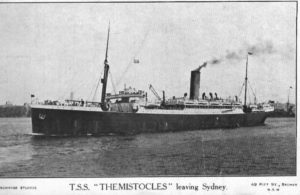
Attribution 3.0 Australia (CC BY 3.0 AU)
To me, whether right or wrong, the secret of empire was committees. A simple ten letter word which contains a rather attractive character structure. This was what I had been looking for for many years and this little booklet from the TSS Themistocles had enlightened me. But seriously, this souvenir of the voyage was really just Blue Remembered Hills and nothing else. It was a moment in time recorded nearly one hundred years ago and detailing a world that has sadly vanished forever. I would like to think that if we scratched the surface of anyone living on this island we would find a committee member underneath. But I am not so sure as the world has changed so much. There is a new world order and whilst Britain (when it is not tearing itself apart from within) has an important part to play, but we are no longer the power we once were.
At the time of the voyages of the TSS Themistocles, the world had just emerged from a catastrophic war. The awful Soviet machine was about to move forward and an obscure artist was beginning to make waves in Germany. But, you would not have thought this on reading the literature from the Themistocles as all seemed well with the world. I am not saying that the booklet should have contained Owen’s grim poems or Eliot’s Wasteland, but my overriding feeling when reading it is that this is an account of a lost generation who were running away from the horrors of a recent war but blindly into an even greater conflict. I may be wrong, but there is something very Waugh like in the tone of this small publication and this is why a find such as this is so important as it gives me a short mirror into the past when times were far more volatile than they are now. This most probably accounts for the light hearted tone of the publication. There were no long haul flights in those days and people who travelled long distances by ship did so for a good reason. So why not have fun along the way no matter what was happening elsewhere.
I have noted that the RSS Themistocles was scrapped in 1947 after just thirty-seven years at sea. She was named after a Athenian statesman and was a 11,200 tonne ocean liner built for the Aberdeen Line (1825-1957) and was launched in September 1910. In her lifetime, she sailed the London to Australia route (via Cape Town) which took some forty days.
During World War One she saw service as a troop ship and was involved in convoy duties during World War Two. The Aberdeen Line sold her to the Shaw Savill and Albion Line in 1932 where she lasted for another fifteen years before she was scrapped. Quite why she was scrapped at such a young age is a mystery to me as she appears to have made it through the second conflict unscathed. She was on the Australian run throughout her life and it is likely that in the austerity of post war Britain, it was no longer economic to run her. Apart from the economics, it might have been that the Themistocles was considered an old ship that was past its sell by date. As you can see, I am only guessing as without researching the subject that is all I have. I quite often sit on Deal Beach and watch the ferries travel between England and France and wonder how long they will actually last.
One can travel by train under the channel in thirty-five minutes and be in Southern France or most European cities in a matter of hours. To me, they seem to be a blast from the past and I would not be surprised to see them fade a little. The Marine Railway Station at Dover is no longer used and the hovercraft service from Ramsgate is also a thing of the past. Most people fly and one can travel to Australia quite quickly.
My wife and I plan to visit this beautiful country quite soon and obviously will have to fly there, but as I stare out of the window of the plane thousands of feet above nowhere, I will think of the Themistocles and her voyages to Australia and back. I will think of the menus and the sports committees of a fine ship which is sadly no longer with us.
The TSS Themistocles may be gone but a couple of her menus are still around as well as the souvenir of her voyages which, I suppose, is better than nothing.
Happy Hunting
